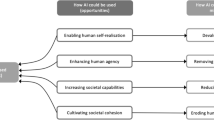Abstract
To teach that being ethical requires knowing foundational ethical principles – or, as Socrates claimed, airtight definitions of ethical terms – is to invite cynicism among students, for students discover that no such principles can be found. Aristotle differs from Socrates in claiming that ethics is about virtues primarily, and that one can be virtuous without having the sort of knowledge that characterizes mathematics or natural science. Aristotle is able to demonstrate that ethics and self-interest may overlap, that ethics is largely compatible with common sense, and that Aristotle’s virtuous person can make ethical decisions rationally. Case studies can help students improve their ethical perception and keep their values from being overwhelmed by corporate culture.
Similar content being viewed by others
References
Alzola, M.: 2007, ‚Character and Environment: The Status of Virtues in Organizations’, DOI 10.1007/s10551-006-9335-7
Aristotle: 1924, Metaphysics, W. D. Ross (ed.) (Clarendon Press, Oxford)
Aristotle: 1936, Physics W. D. Ross (ed.) (Clarendon Press, Oxford)
Aristotle: 1985, Nicomachean Ethics (NE), T. H. Irwin (trans.) (Hackett Publishing Company, Indianapolis, IN)
Beaman A. L., Barnes P. J., Klentz B., McQuirk B. (1978) Increasing Helping Rates Through Information Dissemination: Teaching Pays. The Personality and Social Psychology Bulletin 4:406–411
Belk R. W. (1985) Materialism: Trait Aspects of Living in the Material World. Journal Of Consumer Research 12:265–280
Chaiken S., Giner-Sorolla R., Chen S. (1996) Beyond Accuracy: Defense and Impression Motives in Heuristic and Systematic Information Processing In: Gollwitzer P. M., Bargh J. A. (eds), The Psychology of Action: Linking Cognition and Motivation to Behavior. Guilford, New York, pp 553–578
Chen A. Y. S., Sawyers R. B., Williams P. F. (1997) Reinforcing Ethical Decision Making Through Corporate Culture. Journal of Business Ethics 16:855–865
Daniels N. (1979) Wide Reflective Equilibrium and Theory Acceptance in Ethics. Journal of Philosophy 76:256–282
Darley J. M. (1996) How Organizations Socialize Individuals into Evildoing In: Messick D. M., Tenbrunsel A. E. (eds) Codes of Conduct: Behavioral Research into Business Ethics. Russell Sage Foundation, New York, pp 13–43
Derry R., Green R. (1989) Ethical Theory in Business Ethics: “A Critical Assessment”. Journal of Business Ethics 8:521–533
Donaldson, L.: 2007, ‚Ethics Problems and Problems with␣Ethics: Towards a Pro-Management Theory’, DOI 10.1007/s10551-006-9336-6
Doris J. (2002) Lack of Character: Personality and Moral Behavior Cambridge University Press, New York
Elster, J.: 1984, Ulysses and the Sirens: Studies in Rationality and Irrationality, rev. ed. (Cambridge University Press, New York)
Elster J. (1985) Sour Grapes: Studies in the Subversion of Rationality Cambridge University Press, New York
Elster J. (1998) Emotions and Economic Theory. Journal of Economic Literature 36:47–74
Festinger L. (1957) A Theory of Cognitive Dissonance Stanford University Press, Stanford, CA
Frank R. H. (1988), Passions Within Reason: The Strategic Role of the Emotions W. W. Norton & Company, New York
Frankfurt H. G. (1981) Freedom of the Will and the Concept of a Person In: Watson G. (eds) Free Will. Oxford University Press, New York, pp 81–95
Haidt J. (2001) The Emotional Dog and Its Rational Tail: A Social Intuitionist Approach to Moral Judgment. Psychological Review 108:814–834
Haidt J. (2006) The Happiness Hypothesis: Finding Modern Truth in Ancient Wisdom Basic Books, New York
Harman G. (2003) No Character or Personality. Business Ethics Quarterly 13:87–94
Hartman E. M. (2006) Can We Teach Character? An Aristotelian Answer. Academy of Management Learning & Education 5(1):68–81
Kasser T., Ryan R. M. (1996) Further Examining the American Dream: Differential Correlates of Intrinsic and Extrinsic Goals. Personality and Social Psychology Bulletin 22:280–287
Kupperman J. (1991) Character Oxford University Press, New York
Lewis M. (1989) Liar’s Poker: Rising Through the Wreckage on Wall Street. W. W. Norton, New York
Milgram S. (1974) Obedience to Authority: An Experimental View Harper and Row, New York
Owen G. E. L. (1967) Tithenai ta phainomena. In: Moravcsik J. M. E. (ed.) Aristotle: A Collection of Critical Essays. Doubleday, Garden City, NY, pp 167–190
Pfeffer J. (2005) Why Do Bad Management Theories Persist? A Comment on Ghoshal. Academy of Management Learning & Education 4(1):96–100
Plato.: 1903, Opera, Tomus III, J. Burnet (ed.) (Clarendon Press, Oxford)
Rawls J. (1971) A Theory of Justice Harvard University Press, Cambridge
Rorty R. (2006) Is Philosophy Relevant to Business Ethics? Business Ethics Quarterly 16:369–380
Shoda Y., Mischel W., Peake P. K. (1990) Predicting Adolescent Cognitive and Self-Regulatory Competencies from Preschool Delay of Gratification: Identifying Diagnostic Conditions. Developmental Psychology 26:978–986
Slater L. (2004) Opening Skinner’s Box: Great Psychological Experiments of the Twentieth Century. W. W. Norton, New York
Tversky A., Kahneman D. (1981) The Framing of Decisions and the Psychology of Choice. Science 211:453–458
Velasquez M. (2001) Business Ethics: Concepts and Cases 5 Prentice Hall, Englewood Cliffs, NJ
Werhane P. H. (1999), Moral Imagination and Management Decision-making Oxford University Press, New York
Winter S. (1971) Satisficing, Selection, and the Innovative Remnant. Quarterly Journal of Economics 85:237–261
Wittgenstein, L.: 1953, Philosophical Investigations. G. E. M. Anscombe (trans.) (MacMillan, New York)
Author information
Authors and Affiliations
Corresponding author
Additional information
Edwin M. Hartman is the Peter Schoernfeld Visiting Faculty Fellow at the Stern School of New York University. He has degrees from Haverford, Oxford, and Wharton, and a PhD from Princeton. Hartman’s most recent book is Organizational Ethics and the Good Life (Oxford).
Rights and permissions
About this article
Cite this article
Hartman, E.M. Socratic Questions and Aristotelian Answers: A Virtue-Based Approach to Business Ethics. J Bus Ethics 78, 313–328 (2008). https://doi.org/10.1007/s10551-006-9337-5
Published:
Issue Date:
DOI: https://doi.org/10.1007/s10551-006-9337-5




